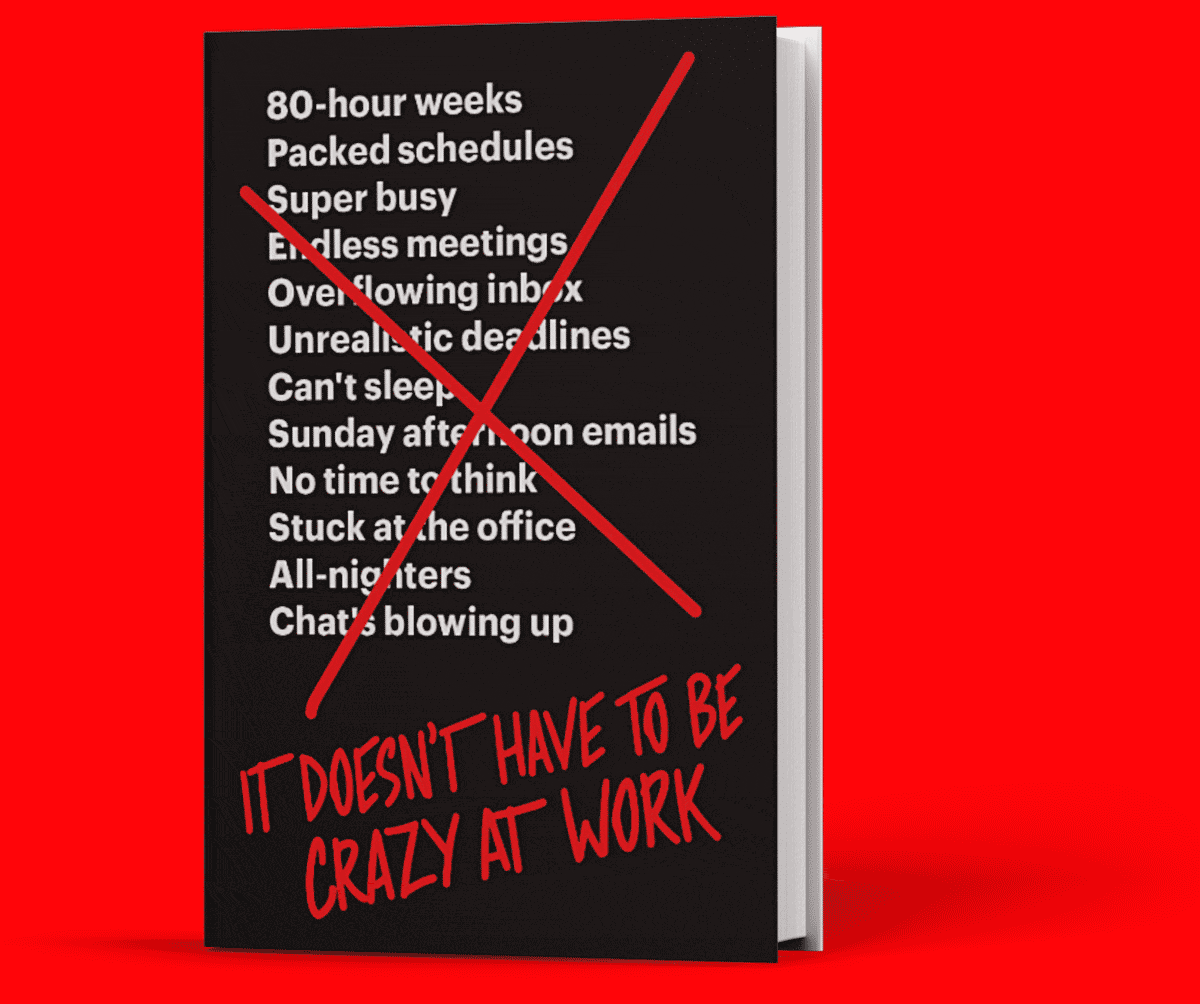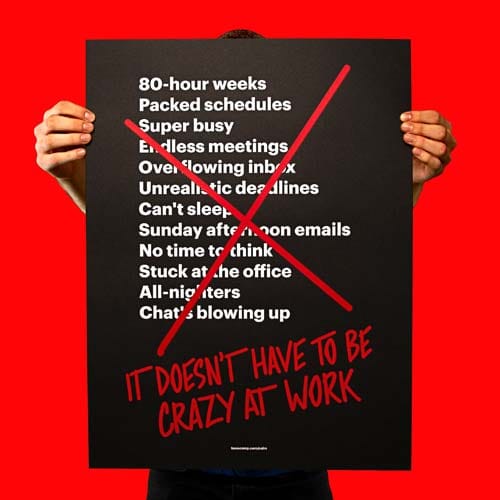It Doesn't Have to Be Crazy at Work
By Jason Fried and David Heinemeier Hansson
Purchase the book in the US:
UK: Amazon, Harper Collins
Canada: Amazon, iBooks, Indigo
Netherlands: Bol
Germany: Amazon
France: Amazon
New Zealand: Amazon, Paper Plus
Get some “It Doesn't Have to Be Crazy at Work” merch:
“It’s crazy at work.” How often have you heard that? Or said it yourself? Probably too often.
For many, “it’s crazy at work” has become their normal. But why's that?
At the root is an onslaught of physical and virtual real-time distractions slicing work days into a series of fleeting work moments.
Tie that together with a trend of over-collaboration, plus an unhealthy obsession with growth at any cost, and you’ve got the building blocks for an anxious, crazy mess.
It’s no wonder people are working longer, earlier, later, on weekends, and whenever they have a spare moment. People can’t get work done at work anymore.
Work claws away at life. Life has become work’s leftovers. The doggy bag. The remnants. The scraps.
That’s just not OK. It’s unacceptable.
What’s worse is that long hours, excessive busyness, and lack of sleep have become a badge of honor for many people these days. Sustained exhaustion is not a badge of honor, it’s a mark of stupidity. Companies that force their crew into this bargain are cooking up dumb at their employees’ expense.
And it’s not just about organizations — individuals, contractors, and solopreneurs are burning themselves out the very same way.
You’d think with all the hours people are putting in, and all the promises of tech’s flavor of the month, the load would be lessening. It’s not. It’s getting heavier.
But the thing is, there’s not more work to be done all of the sudden. The problem is there’s hardly any uninterrupted, dedicated time to do it.
Working more but getting less done? It doesn’t add up. But it does — it adds up to a majority of time wasted on things that don’t matter.
Many modern companies seem to be great at one thing: wasting. Wasting time, attention, money, energy.
Out of the 60, 70, 80 hours a week many are expected to pour into work, how many of those hours are really spent on the work itself? And how many are tossed away in meetings, lost to distraction, and withered away by inefficient business practices? The bulk.
The answer isn’t more hours, it’s less bullshit. Less waste, not more production. And far fewer things that induce distraction, always-on anxiety, and stress.
Stress is an infection passed down from organization to employee, from employee to employee, and then from employee to customer. And it’s becoming resistant to traditional treatments. The same old medicine is only making it worse.
And remember, stress can not be contained. It never stops at the edge of work. It always bleeds into life. It infects your relationships with your friends, your family, your kids.
The promises keep coming. More time management hacks. More ways to communicate. More information spread across separate platforms and disparate places. New demands to pay attention to more and more real-time conversations happening all the time at work. Faster and faster, for what? Panaceas left and right. Snake oil.
On-demand is for movies, TV shows, and podcasts, not for you. Your time isn’t an episode recalled when someone wants it at 10pm on a Saturday night, or every few minutes in the collection of conveyor belt chat room conversations you’re supposed to be following all day long.
If it’s constantly crazy at work, we have two words for you: Fuck that. And two more: Enough already.
At the heart of it all is an unhealthy obsession with rapid growth. Towering, unrealistic expectations drag people down.
It’s time for companies to stop asking their employees to breathlessly chase ever-higher, ever-more artificial targets set by ego, not need. It’s time to stop celebrating this way of working.
Over the last 18 years we’ve been working at making Basecamp a calm company. One that isn’t fueled by stress, or ASAP, or rushing, or late nights, or all-nighter crunches, or impossible promises, or high turnover, or over-collaboration, or consistently missed deadlines, or projects that never seem to end, or manufactured busywork, or incorrect assumptions that lead to systemic institutional anxiety.
No growth-at-all-costs. No constant, churning false busyness. No ego-driven decisions. No keeping up with the Joneses Corporation. No hair on fire.
And yet we’ve been profitable every year since the beginning. We’ve kept our company intentionally small — we believe small is a key to calm.
As a tech company we’re supposed to be playing the hustle game in Silicon Valley, but we’re blissfully far away in Chicago with employees working remotely in 30 different towns around the world.
We each put in about 40 hours a week most of the year, and just 32-hour four-day weeks in the summer. We send people on month-long sabbaticals every three years. We not only pay for people’s vacation time, but we pay for the actual vacation too.
No, not 9pm Wednesday night. It can wait until 9am Thursday morning. No, not Sunday. Monday.
Walk into our office and it feels more like a library and less like a chaotic kitchen. Noise and movement are not indicator of activity and progress — they’re just indicators of noise and movement.
We’re in one of the most competitive industries in the world. An industry dominated by giants and frequent upstarts backed by hundreds of millions of dollars in VC money. We’ve taken zero. Where does our money come from? Our customers. They buy what we’re selling and we treat them exceptionally well. Call us old fashioned.
Our benefits are focused on getting people out of the office, not enticing them to stay longer. Fresh fruits and veggies are delivered to people’s houses, not the kitchen at work. Want to learn to play the guitar in your own time? We’ll gladly support you and pay for that too.
We’ll pay for you to get a massage, but we won’t bring the masseuse to the office. Loosening up for 60 minutes only to tense back up hunched over your desk is faux relaxation. No “stay here” signals. Everything’s about wrapping up your reasonable day, going home, and living your life.
Are there occasionally stressful moments? Sure — such is life. Is every day peachy? Of course not — we’d be lying if we said it was. But we do our best to make sure those are the exceptions. On balance we’re calm — by choice, by practice. We’re intentional about it. We’ve made different decisions than the rest.
We’ve designed our company differently. We’re here to tell you about it, and show you how you can do it. There’s a path. You’ve got to want it, but if you do you’ll realize it’s much nicer over here. You can have a calm company too.
This book points out the diseases plaguing modern workplace and work methods. It calls out false cures, and pushes back against ritualistic time-sucks that have infected the way people work these days. We have a prescription to make it better.
Chaos should not be the natural state at work. Anxiety isn’t a prerequisite for progress. Sitting in meetings all day isn’t required for success. These are all perversions of work — side effects of broken models and follow-the-lemming-off-the-cliff worst practices. Step aside and let the suckers jump.
Calm is profitability.
Calm is protecting people’s time and attention.
Calm is reasonable expectations.
Calm is about 40 hours of work a week.
Calm is ample time off.
Calm is smaller.
Calm is a visible horizon.
Calm is meetings as a last resort.
Calm is contextual communication.
Calm is asynchronous first, real-time second.
Calm is more independence, less interdependence.
Calm is about sustainable practices that can run for the long-term.
By the end of the book you’ll understand it all.
Full list of essays included in the book
First
- It’s crazy at work
- A quick bit about us
- Your company is a product
Curb Your Ambition
- Bury the hustle
- Happy pacifists
- Our goal: No goals
- Don’t change the world
- Make it up as you go
- Comfy’s cool
Defend Your Time
- 8’s enough, 40’s plenty
- Protectionism
- The quality of an hour
- Effective > Productive
- The outwork myth
- Work doesn’t happen at work
- Office hours
- Calendar Tetris
- The presence prison
- I’ll get back to you whenever
- FOMO? JOMO!
Feed Your Culture
- We’re not family
- They’ll do as you do
- The trust battery
- Don’t be the last to know
- The owner’s word weighs a ton
- Low-hanging fruit can still be out of reach
- Don’t cheat sleep
- Out of whack
- Hire the work, not the résumé
- Nobody hits the ground running
- Ignore the talent war
- Don’t negotiate salaries
- Benefits who?
- Library rules
- No fakecations
- Calm goodbyes
Dissect Your Process
- The wrong time for real-time
- Dreadlines
- Don’t be a knee-jerk
- Watch out for 12-day weeks
- The new normal
- Bad habits beat good intentions
- Independencies
- Commitment, not consensus
- Compromise on quality
- Narrow as you go
- Why not nothing?
- It’s enough
- Worst practices
- Whatever it doesn’t take
- Have less to do
- Three’s company
- Stick with it
- Know no
Mind Your Business
- Risk without putting yourself at risk
- Season’s greetings
- Calm’s in the black
- Priced to lose
- Launch and learn
- Promise not to promise
- Copycats
- Change control
- Startups are easy, stayups are hard
- No big deal or the end of the world?
- The good old days
Last
- Choose calm
- Bibliography
- Resources
Other books by Basecamp
Shape Up

REWORK

REMOTE: Office Not Required

Getting Real







